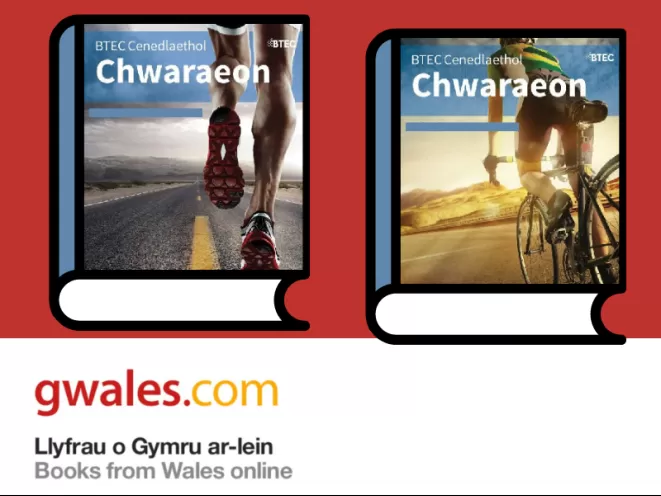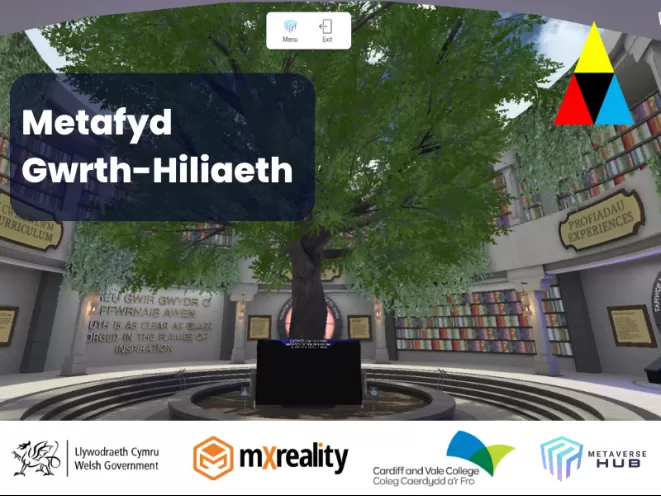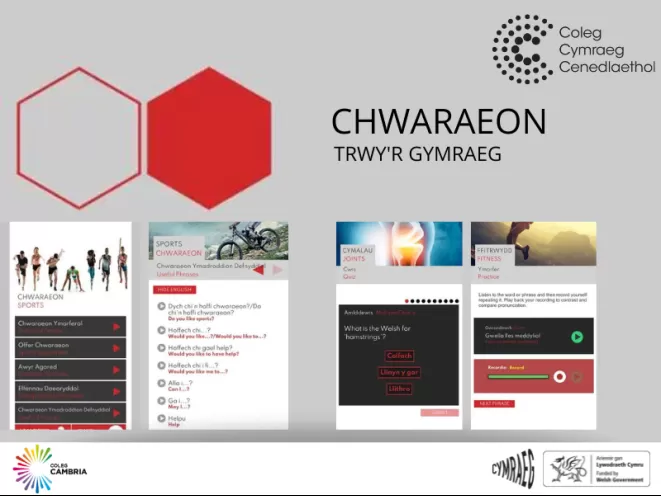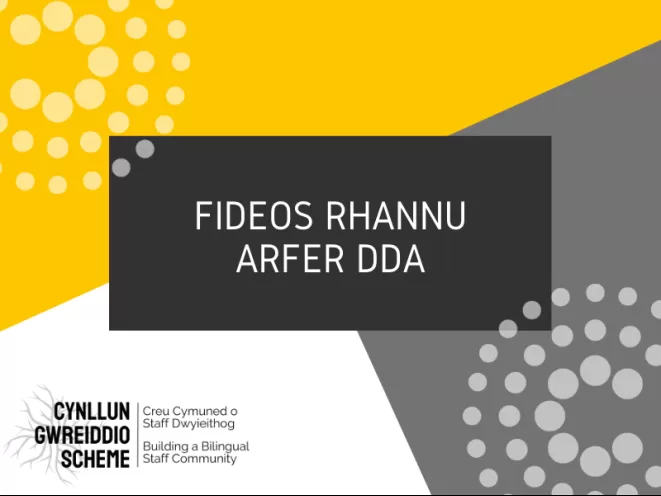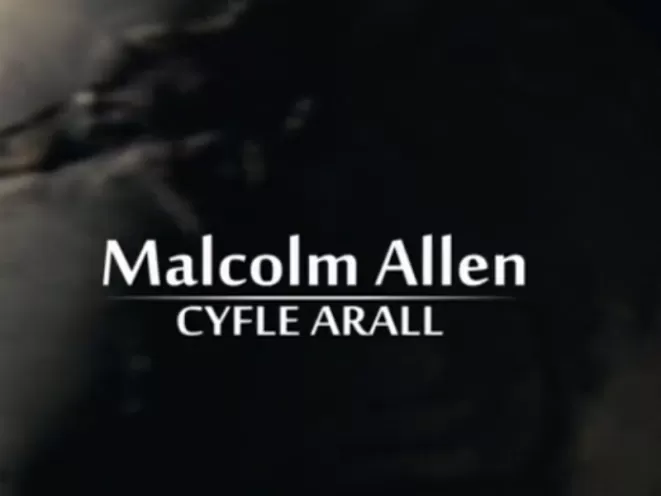25 additional blended learning sessions for learners studying Sport courses (level 3). The units can be viewed in your browser by following the links below. A zip file containing SCORM files for all 25 units is also availabke. Colleges can download the full content (a zip file containing the individual SCORM packages) to place within their local virtual learning platforms. The sessions are bilingual, the English slides can be used as reference, but the questions can only be answered in Welsh. Staff from colleges that are members of the Blended Learning Consortium can access the original English versions on their website http://www.blc-fe.org/. Copyright Heart of Worcestershire College on behalf of the Blended Learning Consortium and Y Coleg Cymraeg Cenedlaethol. These resources are for use only in educational organisations and must not be modified or resold.
BLC Sport Level 3 Units (B)
BTEC National in Sport Coursebooks
Welsh adaption of 'BTEC National Sports Student Book 1', 'BTEC National Sports Student Book 2', and 'BTEC National Sports Units 1 and 2 Revision Workbook' for students studying BTEC the Foundation Diploma and the Extended Diploma. The book supports students through all compulsory units and choice units such as: Anatomy and Physiology; Health, Sport and Welfare; Sport Psychology; Professional Development in Sport. 2016 Specification.* *Please not ethat a new specification has been published, for further information, please visit Qualifications in Wales website.
Welsh Government Anti-Racist Virtual World
In collaboration with mXreality, and working with teams specialising in the subject from Cardiff and Vale College, the Welsh Government has developed an immersive, accessible and expansive 3D metaworld environment, comprising of five areas relating to different themes. They look forward to sharing their experiences, stories and anecdotes with you, and you are invited to engage in an immersive learning experience, which will enhance your understanding of the world. As you explore this world, you are asked to engage with the resources and reflect on their significance. This is an opportunity for you to learn about the cultures and traditions that make up part of our shared identity. The Metaworld consists of the following sections: Experiences The Metaworld of Experiences is situated on a street of representative semi-detached houses in Wales, with access to six houses (three on each side of the street). In each of the houses, you can learn more about the background and interests of the individuals who live there by watching the video playing on the TV and by clicking on some of the interactive items (identified by a three spot icon) in the living room. Immersive Studies The Immersive Studies Metaworld consists of a main lower level area and three upper level areas. The main area has a variety of items of geometrical interest because of their shapes and patterns, which show the connection between mathematics, science and nature. You can learn more about these items by clicking on them. A QR Code is also visible on a panel near some items, which can be scanned with your mobile phone's camera to view a 3D or Augmented Reality (AR) version of the item on your device. The higher level includes: Mathematics room – allows visitors to explore the importance and history of mathematical and geometrical numbers and shapes Hair and Beauty Room – allows visitors to familiarise themselves with the history and origins of hair and beauty Inventions Room – educates visitors about some significant inventions and early contributions to contemporary life World Timeline The World Timeline Metaworld consists of a main central area and four geographic regions, all of which you can access via a tunnel from the central area. Each tunnel displays information that presents the background, identity and image of a representative individual from that region. Each of the four regions (detailed below), comprises four time periods, allowing visitors to experience architecture, images, and representational information in relation to ancient times, medieval times, early modern times, and the world today. The four regions available in this Metaworld are: Africa, Indian Subcontinent, Middle East and Northern Europe. As you move around the world timeline, in the central area and in each of the regions, interactive items you can click on link to videos that present useful additional information. QR Codes are also available in some of the regions, which can be scanned with your mobile phone's camera to view a 3D or Augmented Reality (AR) version of the item on your device. Curriculum This section allows you to engage with a wide range of carefully crafted topics in order to surmise that their plan will be anti-racist. The section consists of the following topics: Sociology Hair & Beauty Health and Social Care Black Feminism Politics Mathematics Film Studies African philosophy English for speakers of other languages Basic Education for Adults Additional Learning Needs Tutorial
Ap Chwaraeon trwy'r Gymraeg (Sports through the medium of Welsh)
The aim of this app is to support learners, apprentices and workers who need support to use the Welsh language confidently in sports related professional situations. The app has been separated into the following units: General terms and phrases Chatting Sports The body The skeletal system Joints Fitness First Aid Training
Sports Science: Coaching
These resources examine some of the theories and the key research in the field of high quality coaching within the context of sports. Each unit contains the following: abstract lecture in the form of video presentations seminar questions bibliography The individual units listed below are available here as one resource. Contributors to this theme: Dr Julian Owen Seren Evans Dylan Blain Sara Hilton Rhiannon Wade Dr Carwyn Jones These resources have been created with support from the HEFCW Investment and Recovery Fund.
Sharing Good Practice Videos
A videos series of further education and apprenticeship providers staff sharing good practice in bilingual and Welsh-medium teaching, training, and assessment in the post-16 sector.
Sports Science: Health and Well-being
These resouces focus on health and well-being in sports.They include units on the benefits of physical exercise, resilience, health determinants, holistic physical development, exercise adherence, obesity, stress management, and educational policies. Each unit contains the following: abstract lecture in the form of video presentations seminar questions bibliography Contributors to this theme: Dylan Blain Dr Lowri Cerys Edwards Seren Evans Dr Anwen Jones Dr Carwyn Jones Dr Julian Owen Dione Rose Catrin Rowlands The individual units listed below are also available as one resource here. These resources have been created with support from the HEFCW Investment and Recovery Fund.
Carwyn Jones, Meilyr Jones, Daisie Mayes, 'Adnabod y peryglon – dadansoddiad cychwynnol o gamblo ymysg myfyrwy...
The aim of this research was to gain insight into the potential risks associated with sport students’ gambling habits. There are a number of common risks associated with gambling, but sport students are subject to additional risks because they play in games that are part of the betting market and they must therefore comply with gambling integrity rules. Using focus groups with male and female rugby and football players we found that gambling was common. We also found that there was a lack of awareness and understanding about how gambling problems might arise. We also found that there was a laissez-faire approach to the gambling integrity rules.
Profion Ffitrwydd Website - How to conduct fitness tests
A website containing videos and written instructions on how to perform health-related fitness assessments, in accordance with ACSM Guidelines. The resource would mainly be useful up to level 4. The aim of this resource is to provide advice and guidance on conducting initial health screening and fitness assessments, in line with ACSM protocols. There is a video that explains and illustrates the protocol, and a supporting document which illustrates the protocol in written format for each of the following aspects: Health screening Participant instructions Blood pressure Resting heart rate BMI measurement Waist and hip circumferences Cardiorespiratory fitness Hand grip test Push-up test Sit and reach test There is a link to the website below:
Malcolm Allen: Cyfle Arall (2014)
Rhaglen bwerus am y cyn bêl-droediwr rhyngwladol, Malcolm Allen o Ddeiniolen, wrth iddo siarad yn agored am y tro cyntaf am dreialon ei fywyd a'i yrfa liwgar. Mae Malcolm a'r teulu yn siarad yn ffraeth ac yn onest am y cyfnod tywyll hwnnw lle bu bron iddo golli popeth. Ar ôl brwydr hir, mae Malcolm wedi dod drwyddi ac wedi cychwyn ar bennod newydd yn ei fywyd. Ymysg y cyfranwyr mae Graham Taylor, Mick McCarthy, Kevin Keegan a Syr David Brailsford. Rondo, 2014. Oherwydd rhesymau hawlfraint bydd angen cyfrif Coleg Cymraeg i wylio rhaglenni Archif S4C. Mae modd ymaelodi ar wefan y Coleg Cymraeg Cenedlaethol i gael cyfrif.
Pêl Droed, Alcoholiaeth a Gwellhad: Oes Gwersi i'w Dysgu?
Darlith gan Dr Carwyn Jones yn amlinellu canlyniadau ymchwil ansoddol i mewn i brofiad cyn bêl-droediwr proffesiynol a oedd yn dioddef o alcoholiaeth. Mae'n olrhain ei hanes o'i blentyndod drwy yrfa fer broffesiynol, ei gwymp i mewn i ddibyniaeth a'i adferiad. Gall myfyrwyr is-raddedig ddefnyddio'r adnodd er mwyn cael: Gwybodaeth ddamcaniaethol am ddibyniaeth Esiampl o ymchwil dadansoddol astudiaeth achos Gwybodaeth am effeithiau dibyniaeth
Physical Education teachers’ perceptions of high-quality Physical Education in Welsh-medium schools across sou...
In a report in 2013, the Welsh Government suggested that raising the status of Physical Education (PE) to become a core subject, similar to Welsh and Mathematics, is an essential element in tackling the current obesity epidemic. However, PE lessons must be of a high quality in order to have a positive effect on pupils. PE teachers play a crucial role in delivering high-quality PE lessons; therefore, gaining an understanding of their perceptions about high-quality PE is essential. Interviews were held with ten PE teachers (seven males and three females) from Welsh-medium schools across south Wales. Similarities between the theory and teachers’ perceptions were evident, for example the importance of creating a positive learning environment. However, there were differences between the theory and practice, including lack of clarity about the term physical literacy. One implication of the study is the need to consult with PE teachers to design policies for high-quality PE. In the future, action research should be undertaken to promote the term physical literacy.


